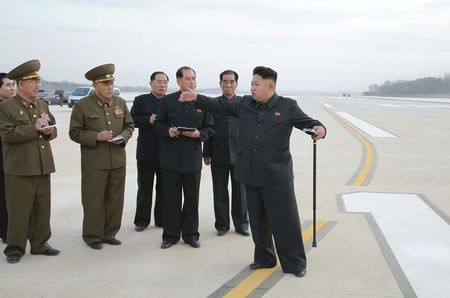SEOUL (Reuters) - North Korea is operating a new nuclear facility that could double its known capacity to produce uranium-enriched fuel for nuclear weapons, a South Korean news report said on Wednesday.
The move, if true, would be a further step in defiance of international pressure on Pyongyang to end its nuclear programme in the form of layers of U.N. sanctions.
The new facility sits right next to a plant where in 2010 the North allowed a team of U.S. nuclear experts to tour what one described as a sophisticated and "industrial-scale" uranium enrichment facility.
"We've discovered the plant has recently been completed and is now in operation," South Korea's Joongang Ilbo newspaper, a mainstream daily, quoted a government official who handles intelligence on North Korea as saying.
Images taken by U.S. intelligence authorities with cameras mounted with heat sensors revealed telltale signs pointing to the operation of centrifuges inside the plant, the official was quoted as saying.
South Korea's Foreign Ministry, which is involved in the monitoring and negotiations over the North's nuclear activities, did not immediately have comment.
The plant, if operational and producing weapons-grade uranium, could sharply boost the North's ability to build nuclear arms by way of a second route to obtain fissile material in addition to its stockpile of plutonium.
The North is believed to have made advances in trying to build an atomic bomb, with three test detonations of nuclear devices, but is still believed to be working on the technology to miniaturise a nuclear warhead to mount on a delivery system.
The commander of the U.S. military in South Korea has said he believed the North has the capability to build a nuclear warhead that can be mounted on a ballistic missile although there was no test or evidence that it had taken that step.
North Korea took a team led by Siegfried Hecker, Stanford University professor and a former head of the U.S. Los Alamos National Laboratory, to its Yongbyon nuclear site and showed them a facility its officials said contained 2,000 centrifuges.
Hecker said he had no way of verifying that number or whether the equipment was working but said it was likely the North was capable of running the facility as it claimed.

He estimated the North had enough plutonium left for four to eight weapons. It was possible it had mastered the technology for both the plutonium and highly enriched uranium bombs, he said.
(Reporting by Jack Kim; Editing by Michael Perry)
